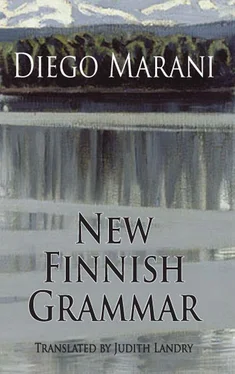The doctor had made the preparations for my departure. I would leave with the troop train that was taking the wounded from the Tübingen back to Germany; from Trieste, it would go to Dresden via Ljubljana, Vienna and Prague. From Dresden, I would carry on to Berlin and then Stettin, with a laissez-passer the doctor had obtained from the civil servant we had met in Opicina. From there I would be able to take ship for Helsinki. The doctor gave me several letters of introduction to be given to a colleague of his in the military hospital in Helsinki, in which he explained my situation and described the injury I had sustained.
‘Ask for Doctor Mauno Lahtinen,’ he said, making sure I had understood. ‘He’s an old classmate of mine from the time when I was studying at the University of Helsinki. We have seen each other only once over these last twenty-six years, at a neurologists’ congress in Berlin, but we are in regular correspondence. I know that he is doing service at the main military hospital in Helsinki.’ He also gave me the money for the journey, and for my initial expenses. He was insistent that I should not hesitate to mention his name if I had problems with the German authorities.
‘If the worst comes to the worst, tell them to telegraph the Gauleiter of Carinthia, Doctor Friedrich Reiner, the man we met in Opicina. He knows all the details.’
A fine rain was falling on the morning I boarded the train to Dresden. The sky was full of billowing, low-lying clouds. Doctor Friari came with me to the platform. I sought for words of thanks, but could manage only to clasp his hand. He noted my emotion, but on this occasion contained his own.
‘Courage! You are going home! Oma maa mansikka …’ At the moment of our leave-taking he assumed a soldierly indifference which he had never shown before. His last words were as follows:
‘I hope you will be able to make a new life for yourself. Or find the one you lost. I will not ask you to keep in touch. I know that when you find peace and serenity you will not want to think back to these days. But at least, if you can, remember me. Being remembered — that is all we ask for, is it not?’
Drawing his overcoat around him, he said another quick goodbye as the train pulled out. I never saw him again.
Reading these pages, I felt deeply moved. Reflected in this narrative I glimpsed aspects of myself that were quite unknown to me. It contains almost all the words I spoke, and my own personal story sounds even more bitter as told here. Though he could speak no language at the time, that man could read into my silences, could sense my fear. I well remember our first meeting in my office, on board the Tübingen. Without realizing what I was doing, I had begun telling him my story. I was convinced that he could not understand me, and I was talking mainly in order to give vent to my feelings, something I had never been able to do, not even with the sailors in the Hamburg church, for fear that someone was spying on me. I had not realized it, but my pain was so intense that it leapt clean over those words and straight into the heart of that man, whom I had treated like a deaf-mute. How he managed to articulate whole portions of my outbursts, I do not know. Luckily I still have the diary I kept during that time. The green notebook, as he called it. Alongside my personal notes, I registered everything significant that happened on board. That notebook has helped me to reconstruct the chain of events with considerable accuracy, and to recall our conversations. Above all in the first part, some passages of the document were hard to interpret, and I had trouble making sense of them. But, spelling mistakes apart, many of the sentences I used to tell my story are reproduced here with alarming accuracy, as though they had been learned by heart. So heavily had those words weighed on that man’s mind that he had put his trust in me.
After long weeks spent off Cyrenaica, picking up the war-wounded from the fighting in Africa, my periodic returns to Trieste came as a relief. That light-filled bay gave me an illusion of peace; I had my feet on dry land at last. No longer haunted by a sense of danger, at night I finally found sleep, I had time to do a little reading, even to do nothing, if I so chose. I was drawn to that unforthcoming, foundling city. Neither Italian, not Austrian, nor Slav, it thrust its shameless beauty in my face, and I looked back at it a little shyly, as one might cast glances at a woman known to be unattainable. Sometimes I fantasized that I would stay there when the war was over. But I felt that it was too grand a setting for a life as colourless as mine. Those who live in such a city have an obligation to be constantly in love, because great joys, like great sorrows, demand grand backdrops. When the Tübingen, emptied now of its cargo of suffering and its stench of flesh, weighed anchor to sail northwards once more, the sight of Trieste receding into the distance brought with it an overwhelming sense of the most tender melancholy; parting is indeed such sweet sorrow. Once again I felt that I had missed an opportunity to embrace that city, and I imagined that perhaps, disdainful though she was, in some sense she too yearned for me.
The journey to Opicina on that autumn morning, over the Carso emerging from the mist, remains imprinted in my mind, together with everything I said, so I was able to reconstruct its gist. It was hard to find a way of making myself understood. We were dealing with concepts, ideas, and at that time the author of these pages had words for things, and things alone. Today I see, with some surprise, that he had retained my words until such time as he was able to decipher them. It is true, I too would have liked to have been sailing back to Finland; to take advantage of the chaos of war in order to do away with the neurologist from the military hospital in Hamburg and replace him with the Helsinki university student of twenty-six years earlier. But this was no longer possible. Twenty-six years do not go by without leaving their mark. Memory overlays itself like lava, causing recollections to be preserved, it is true, but also stealing them from us for ever. Memory, which the author of these pages was so wretchedly pursuing, still has me in its grip. Memory is the tithe of pain I pay, each day, when I wake up to this world and agree to live in it. Why, I do not know. Perhaps because it is easier to be born than to die; perhaps because of the unwholesome interest which all men feel in seeing how it will all end, whatever pain it may cause them.
I did not expect my arrival in Helsinki to be like this. I was not expecting that grey dawn, that threatening sky. The city which was coming towards me like a looming mass had nothing welcoming about it. The Swedish merchantman on which I had travelled, the Ostrobothnia, had turned its engines off. It pitched meekly amidst the slabs of drifting ice, its rusting prow pointing skywards. On the quay, silent men had picked up the hawsers from the muddy snow and were running to secure them to the moorings. The general mood was wary, watchful. Some soldiers had already come aboard and were looking idly into the hold, accompanied by a sailor. The captain, who had accepted me on board reluctantly, and only after the closest questioning, was smoking nervously, scanning the façades of the black buildings in front of the port. I thought back to the barracks at Stettin, the long line of soldiers walking, heads bowed, and the strange brightness of their new mess tins; that prying face behind the desk, my documents, leafed through times without number. Then the journey by lorry to the port, the rain-filled potholes, the jumble of wharves, and that suspicious look for ever trained on me, that mouth, shaped like a scar, opening every now and again, as though it were on the point of saying something, but then remaining silent.
Читать дальше












